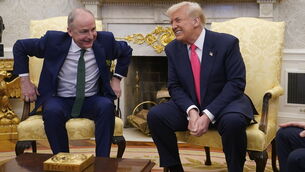Sarah Harte: We need an educated president with moral authority and a clear vision

'The notion of a down-home, loud-mouth individual as suitable for high office has its roots in John McCain's decision to run Sarah Palin as his running mate in the 2008 American presidential election.' Picture: Getty Images
I sincerely wish I had one whit of the personal confidence some of those rumoured to be seeking the presidential nomination possess.
Although in the case of some candidates who have failed to rule themselves out, they seem to possess what the mother of a long-standing friend of mine calls "ignorant courage". This is psychologically known as the overconfidence bias, where individuals cognitively overestimate their abilities, wisdom and knowledge.
Love them or hate them, the calibre of our last three presidents, the two Marys and Michael D, has been outstanding as the personification of not just Official Ireland but us as a nation.
President Higgins will leave office on November 11 after two highly successful terms, although not without its bumps. It is expected that the election to replace him will take place in late October or, at the latest, early November. The nomination process for all political parties, including FF, FG, Sinn Féin, and the centre-left parties, as well as Independent candidates backed by city or county councils, is likely to conclude by the end of August or the start of September.
In the meantime, during the silly season, everyone from former taoisigh to journalists, public intellectuals, and MMA fighters have signalled that they are open to conversations and persuadable. Many of the names being circulated are probably not credible, although it is revelatory to see who fancies themselves in the role. Watch out, world, Important Person coming through.

One interesting opinion I read this week suggested that we hold lotteries for the presidency, as we do for jury selection in criminal trials. First, the jury is out on juries. Opinion is divided legally on whether it’s better to have a sole judge or a jury of your random, legally uneducated peers, but that’s a topic for another day.
Secondly, the idea that we would have an everyman or woman for the presidency seems suspect. What about quality control? I mean, why not be done with it and have a high-stakes reality show to decide on a candidate while we’re at it? A sort of presidential . Why shouldn't we value the opinions of experts in a particular field over those of random citizens?
If there’s one thing we should avoid, it's elevating mediocrities or even public figures who, while talented in their own silo, lack the necessary qualities to be president. Selectivity and standards are not inherently elitist. They are rational ways to ensure quality.
Of course, the Irish president, in comparison to, say, the American one, is a figurehead. Many of the presidential powers cannot be exercised without the discretion of the government, but this does not mean it is "a makey-uppy job", as Ryanair CEO Michael O’Leary maintains.
One of the key functions of our president is to contribute meaningfully to the public discourse and to foment and forward new ideas for shaping Ireland's future in line with the themes of their presidency. This has an impact on civic life, our self-perception, and how we present ourselves to the world in terms of our collective values.
The presidential role requires a person of natural intellect enhanced by education and experience. What Conor McGregor (facing a possible investigation for perjury in the Nikita Hand case) might describe as an "ooh-la-la" person, mistaking as he does education for elitism. He is in good company there.
In 2025, the logical endgame of this lie means that an elite oligarchy composed of the ultra-rich, including phenomenally wealthy tech tycoons, masquerades as an anti-elite, attacking, amongst other things, education and universities in the name of the everyman.
Both Trump and JD Vance repeatedly espouse this anti-elitism idea, although both are Ivy League graduates. Meanwhile, they establish and guard their own elitist social hierarchies.
Thomas Jefferson, who drafted the American declaration of independence, believed in selecting individuals based on merit rather than social class. “By that part of our plan which prescribes the selection of youths of genius from the classes of the poor, we hope to avail the state of those talents which nature has sown as liberally among the poor as the rich, but which perish without use, if not sought and cultivated.”
He saw public education as the means for those not born to “wealth, birth, or other accidental conditions or circumstances” to be “able to guard the rights and liberties of their fellow citizens.”
The visionary FF minister for education, Donogh O’Malley, who introduced free secondary education for everyone in Ireland up to the age of eighteen, understood better than anyone the nexus between people being uneducated and the loss of human resources. Public education is the only credible way for the everyman to have their speak, it is the opposite of elitism.
Certainly, some of them had excelled in their respective areas, but overall, they fell short of expectations for the job at hand. Countries are not corporations that can be run like pure businesses by CEOs focused solely on the bottom line. Nor should celebrity and a high-profile spot on television be considered an essential attribute. The newly retired and much-loved, talented broadcaster Joe Duffy has wisely ruled himself out. Too cute by far.
We know an education alone does not necessarily impart the wisdom of Solomon. At the very least, we need an educated president who understands boundaries, is inclusive of all citizens, understands multiple perspectives, possesses decorum and gravitas, has moral authority, and is a good communicator, with a clear vision. Plus, a squeaky-clean past, which is a hell of a lot to ask of anyone.
When the candidates are confirmed, we had better listen to their pitches carefully, and not vote reactively because of the housing crisis, or because of multiple other reasons we are browned off as the citizenry. It’s tempting, I know, to go to the ballot box and give the two fingers, but it’s too high-risk.
The notion of a down-home, loud-mouth individual as suitable for high office has its roots in John McCain's decision to run Sarah Palin as his running mate in the 2008 American presidential election. It was at this point that Trumpism became possible, paving the way for celebrity-driven politics everywhere.
We have seen all too clearly in America what happens when people vote for a celebrity president. In a kind of race to the bottom, the unthinkable becomes normalised, a causal chain in which parties compete for a desired result by making increasingly larger concessions, leading to a downward spiral of competency and a sacrifice of standards. Meanwhile, all boats sink with the lowering tide.
We need a suitably qualified candidate who embodies a message of unity and progress and who is neither a beneficiary of nor a cynical exploiter of disenchantment with establishment politics, because, as the ad goes, we are worth it.














